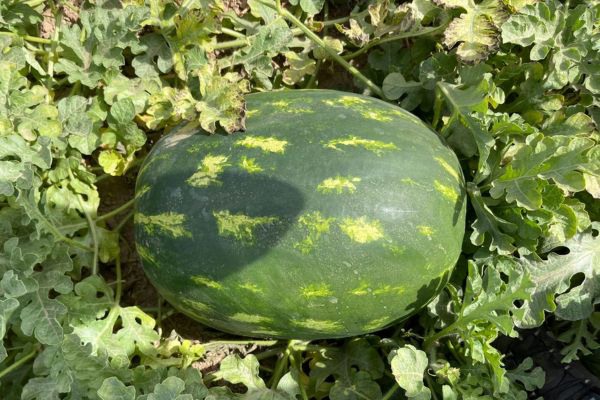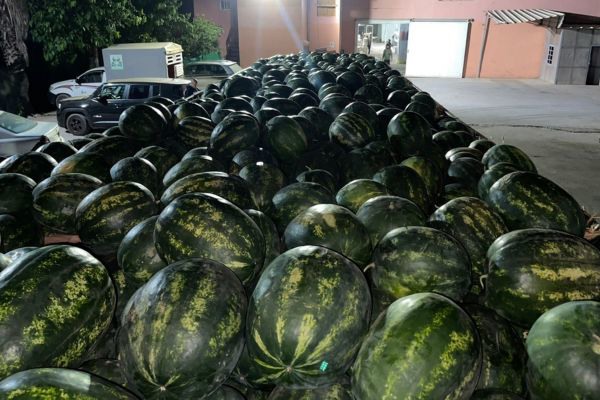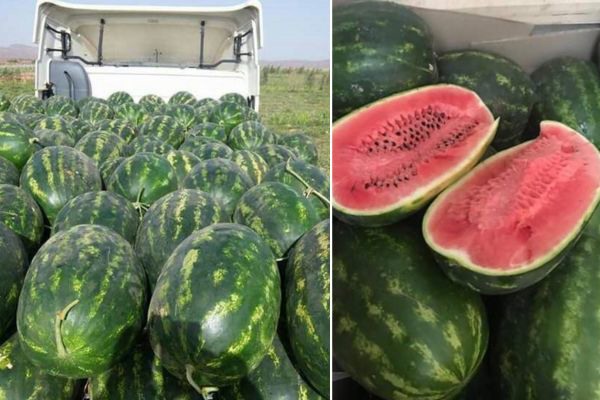More Moroccan watermelon volumes this season? less? The uncertainty is still hanging, statements contradict each other, and it seems that this question has become embarrassing in a context where the Moroccan authorities have put in place restrictions on production in some regions of the country due to water stress, and where the watermelon industry is being singled out.
Mehdi Benchekroun, CEO of DMB & Co, said: "There is always uncertainty regarding volumes, but it seems to me at my level that there is no shortage at the moment. I have not seen any difference in the Moroccan markets compared to last year, knowing that it is only the production of Zagora that is on the market now. The prices also do not reflect a shortage. I still have the capacity to export 1-2 trucks per day, the same pace as last year."

According to the exporter, the watermelon market is still slow because of the cold temperatures in Europe. "The difficulty is currently not at the level of supply, but there are no large orders from European markets at the moment since temperatures are still low, and consumption of watermelon is strictly connected to the summer, good weather, and high temperatures. Buyers do not want to refrigerate stocks while waiting, which is normal. The exported volumes are then small at the moment, or at too low a price which does not encourage exporters."
Mehdi continues: "But it is expected that European demand will pick up as soon as temperatures rise. At that point, everything will depend on the harvest of other Moroccan regions, such as Souss Massa, Loukous, and Gharb. If the harvest is in limited quantities, and the watermelon of Zagora remains dominant on the market, which is unlikely, then we could talk about insufficient supply."
At the price level, fluctuations are daily but not very important, adds Mehdi "The exportable watermelon of Zagora was sold at the wholesale market at 8-9 MAD 2 weeks ago, 6 MAD a week ago, 5 MAD on Monday, May 1, and 6-7 MAD yesterday. Fluctuation is normal in this atmosphere of hesitation and early season, but the market will eventually regulate itself when demand becomes clearer.

Moroccan watermelon is eagerly awaited by customers in Europe, adds Mehdi, after the entry into the market of Mauritanian and Senegalese watermelon. "There have been several errors of judgment on the part of Mauritanian producers, including Moroccan investors who have produced in Mauritania this year. The most obvious is that they started the campaign as early as January when no one eats watermelon during cold weather. European customers did not appreciate the quality, and even if the quality is good, the eating experience is bland in a cold winter climate. Also, the exporters faced for the first time the ferocity of the European dispatchers. All this is attributable to a lack of experience, given that this is the beginning of the watermelon industry in this country."
Speaking of ferocity, the exporter refers to the terms of payment as sometimes not favorable to exporters and relates his own experience: "When I export watermelon at open price, and the dispatcher requires a commission in addition to their margin, on figures that I can not verify, and systematically sends me fictive complaints about the quality that I can not verify, while I am sure that my shipment is good, it is better not to export. In short, some buyers bet on the market, and when they win they want to keep everything, but when they lose they want to impute the loss to the Moroccan exporter. It's a funny way to do business."
"We advocate for more fairness, professionalization, clear contracts, insurance payment on damage, and traceability. I once received a claim from a dispatcher for rotting stock, when he was the one who broke the cold chain, and that time is over," says the exporter.

Regarding demand, the Moroccan watermelon remains "the most prized in Europe", according to Mehdi. "European consumers are fond of the Moroccan watermelon in the type large size with seeds, alongside the Spanish watermelon small size seedless. These two types are unbeatable on the market. I expect solid demand from international markets in Rungis, Perpignan, Rotterdam, Breda, Stuttgart, and Munich. There is also great potential in the UK market. Concerning Russia, it is well supplied by Iran and Turkey, and it is a difficult market to access now anyway. The demand from the Middle East is unclear at the moment, and we'll see how that develops."
Finally, regarding the extent of the campaign, Mehdi expects a long season: "The Moroccan summer is set to be hot, and the season could last until the end of August like last year. A long season, with good long days of sunshine, is the guarantee of a very good quality watermelon. The first harvests have already been of good calibers, 10 kg on average. The next harvests will be even bigger, with a pronounced oval shape, a sandy texture, and a sweet and refreshing taste."
For more information:
Mr. Mehdi Benchekroun 
DMB & CO
Tel.: +212661214337
Email: [email protected]










